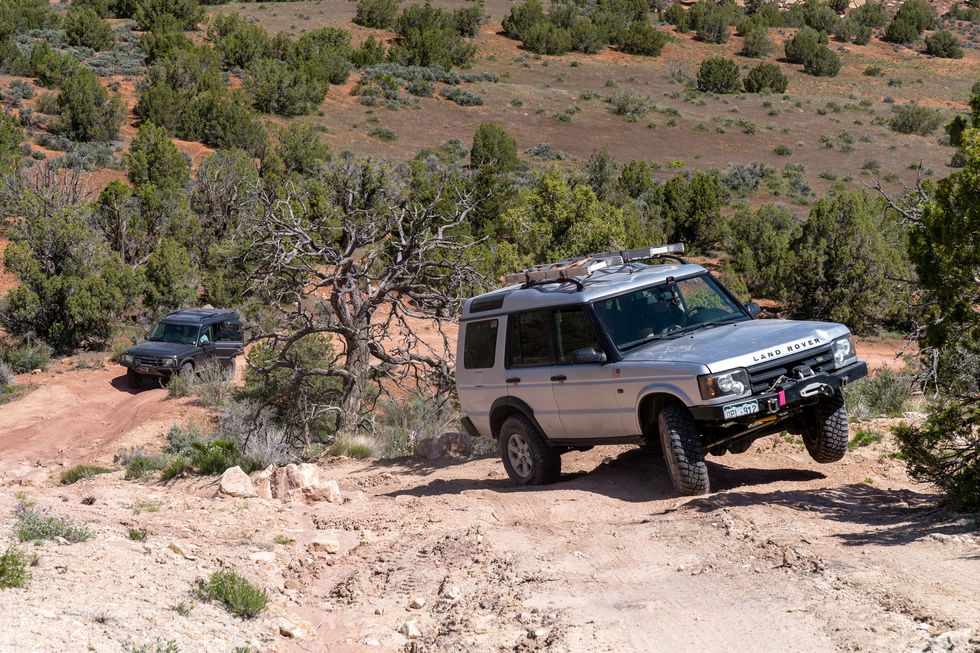
From the September 2023 issue of Car and Driver.
Kira Cameron looked concerned. “You don’t know your blood type?”
“I don’t do a lot of bleeding,” I mumbled.
To be clear, I wasn’t bleeding. I was just checking in at Cameron Advanced Mobility (CAM) for a three-day wilderness training experience in the ruddy rock canyons near Arches National Park in Utah. I’d remembered my hiking boots, headlamp, and work gloves—okay, flowered gardening gloves, but they have leather palms—so I was feeling fairly confident about training with a team whose usual students were military special forces preparing to off-road in war zones. Until the blood question.
“I’m an EMT. It’ll be fine,” said CAM founder and lead instructor Ken Cameron. Kira signed me in and waved me toward the hotel bar, where several broad and bearded men were comparing stories of how and when they reattached their fingers. First lesson of the trip: Table saws are real bastards, and duct tape always comes in (sorry for this) handy.
The CAM team doesn’t make a habit of severing digits. Classes emphasize preservation of person and vehicle, but the staff comprises the sort of fear-less problem solvers who could calmly wrap their detached thumb in an iced rag and drive themselves to the hospital. I bet they all know their blood type.
Cameron’s love of outdoor adventure began when he was a kid in rural New Jersey. “We weren’t allowed in the house during the summer,” he said. But it didn’t become a career until the mid-’90s. He joined the army at 17, and things took a motorsports turn when he came across a book about the Camel Trophy race. He was so enthralled that he joined the U.S. Camel Trophy team and competed from 1996 until the last running in 2000. He claimed second place in ’96 and, perhaps more important, met Webb Arnold, a fellow competitor, now a fellow instructor.
All the CAM instructors seem to be veterans, off-road racers, or both. Their focus for the past 20 years has been military training: in trucks, on bikes and horses, amid snow, in deserts and jungles. “We spend probably 100 days a year in a tent,” Ken said.
What makes his classes different from many other off-road experiences is the focus on self- sufficiency and on-trail fixes. Techniques for minimizing vehicle damage are the starting point, but if something breaks despite best practices, the students pull on their gloves and start wrenching. Arnold tells me it’s often the first time many soldiers ever turn a bolt: “You get some sharpshooter from New York, and he’s never owned a car, let alone worked on one.”
My CAM class was less military, more civilian expeditionary. High-end but still rugged adventure training is a new addition to the CAM offerings. Ken’s group can arrange a safari-style experience anywhere in the world, with as much (or as little) support as the client desires, including prepared campsites and a private chef. I was almost disappointed, since I had just learned how to pronounce “bivouac,” but even if we were drinking rosé around a campfire each evening, the driving during the day was genuinely hard: climbing hills so steep that the windshield showed only clouds, with loose sand below the tires and jutting boulders ahead, and vertical winch exercises across slick rock faces. “They’re just your standard crane-operator signals,” instructor Charles Hendrickson told me, as I nervously waved my driving partner forward with one hand while whirling the other in a command for winch-in.
I may never need to use my standard crane-operator signals or move two cars with one starter (start one, remove starter, install in second car, start), but knowing that it’s possible, and that I’m capable, is a confidence boost for any future adventure. I guess that makes me B positive?

Senior Editor, Features
Like a sleeper agent activated late in the game, Elana Scherr didn’t know her calling at a young age. Like many girls, she planned to be a vet-astronaut-artist, and came closest to that last one by attending UCLA art school. She painted images of cars, but did not own one. Elana reluctantly got a driver’s license at age 21 and discovered that she not only loved cars and wanted to drive them, but that other people loved cars and wanted to read about them, which meant somebody had to write about them. Since receiving activation codes, Elana has written for numerous car magazines and websites, covering classics, car culture, technology, motorsports, and new-car reviews.
#Winch #Pinch
Source link








